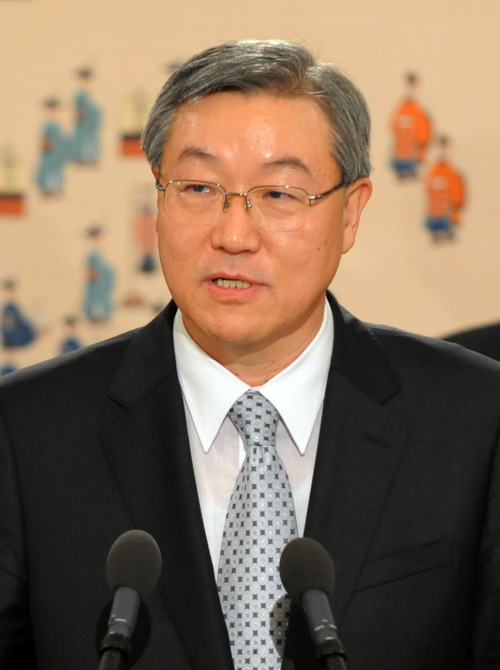
The following article was contributed by Minister of Foreign Affairs and Trade Kim Sung-hwan. ― Ed.
Microsoft founder Bill Gates commended Korea’s transformation from a recipient of aid to a donor as a model case of development cooperation at the G20 Cannes Summit. He further complimented Korea’s pledge to double the volume of its ODA by 2015 amid financial difficulties sweeping the globe. His comment symbolizes the status of Korea and the respect it has gained in the global development cooperation community.
Once an undeveloped country with a per capita income of $67, Korea has turned itself into an emerging economic powerhouse. Last year, Korea became a member of the Development Assistance Committee of OECD, a donors’ club. At the G20 Seoul Summit of 2010 Korea took the lead in adopting the “Seoul Development Consensus.” Korea’s success story has attracted attention from the international community. And developing countries seek to learn the lessons from its unique development experience.
Against this backdrop, Korea becomes once again the center of global attention. World leaders and dignitaries such as U.N. Secretary-General Ban Ki-moon and U.S. Secretary of State Hillary Clinton, over 100 foreign, finance and development ministers, and 40 heads of major international organizations have gathered at the Busan High-level Forum from Nov. 29 to Dec. 1 to forge a new global compact “toward a better world for all.” The forum also brought together more than 3,000 participants from all corners of the globe.
Over the past six decades, the international community has assisted developing countries in their endeavors to develop. Despite many positive outcomes, an estimated 1.4 billion people are still mired in absolute poverty, and 48 countries, a quarter of the 193 U.N. member countries, are labeled least developed countries. All this has led to a growing call for the enhanced effectiveness of all forms of development cooperation.
Dramatic changes in the global development landscape also require new approaches. The recent global financial and fiscal crises call for new partnership in development cooperation as the traditional donors are facing growing difficulties at home in mobilizing essential resources and political support without enhancing effectiveness of development cooperation. In the meantime, “shifting wealth” and “the rise of the rest” brought in new and diverse actors such as emerging economies and the private sector with new modalities of cooperation.
At this critical juncture, the Busan Forum marks a turning point in the history of globally concerted efforts to attain internationally agreed development goals including the U.N. Millennium Development Goals. It is an excellent opportunity to galvanize the momentum for development cooperation. Korea, as the host of the event, places priority on achieving the following two goals at the end of the meeting.
First, Korea is strongly committed to deepening the core aid effectiveness principles of ownership, mutual accountability, managing for results and alignment and harmonization. At the same time, Korea is keen to move forward the development paradigm from “aid” to “aid and beyond,” addressing key issues that have a far-reaching impact on development, such as policy coherence, effective institutions and policies and human resource development including gender equality. Undoubtedly, aid is indispensable but one of many elements in the equation of development ― indeed, aid alone cannot make development happen.
Secondly, the Busan Forum launched “new global partnership for effective development cooperation.” The current partnership based on the old and narrow definition of donor-recipient has obvious limitations to which extent it reflects the current trends and reality of development cooperation in which diverse actors and modalities play increasingly important roles. There was, therefore, a need to forge a new mechanism to embrace a whole range of providers of development cooperation, such as emerging economies, civil society organizations and the private sector, and to facilitate various modalities including South-South and Triangular cooperation. The Busan forum was open to all development partners, engaging them to share their own experiences and vision. Korea believes that this new partnership will support and monitor the implementation of the commitments made at the forum. And it will promote accountability and transparency for more results, while providing an open space for knowledge sharing and mutual learning.
Korea firmly commits itself to playing a catalytic role in promoting effective development cooperation even in the post-Busan process. In today’s closely interconnected global community, development is not a matter of philanthropy but one of shared prosperity. Indeed, underdevelopment poses a grave threat to peace and stability, and democracy at the national and global levels. With effective development cooperation, we can turn the global challenges into opportunities “toward a better world for all.” We sincerely hope that the Busan Forum indeed takes us closer to translating these opportunities into reality.
By Kim Sung-hwan
Microsoft founder Bill Gates commended Korea’s transformation from a recipient of aid to a donor as a model case of development cooperation at the G20 Cannes Summit. He further complimented Korea’s pledge to double the volume of its ODA by 2015 amid financial difficulties sweeping the globe. His comment symbolizes the status of Korea and the respect it has gained in the global development cooperation community.
Once an undeveloped country with a per capita income of $67, Korea has turned itself into an emerging economic powerhouse. Last year, Korea became a member of the Development Assistance Committee of OECD, a donors’ club. At the G20 Seoul Summit of 2010 Korea took the lead in adopting the “Seoul Development Consensus.” Korea’s success story has attracted attention from the international community. And developing countries seek to learn the lessons from its unique development experience.
Against this backdrop, Korea becomes once again the center of global attention. World leaders and dignitaries such as U.N. Secretary-General Ban Ki-moon and U.S. Secretary of State Hillary Clinton, over 100 foreign, finance and development ministers, and 40 heads of major international organizations have gathered at the Busan High-level Forum from Nov. 29 to Dec. 1 to forge a new global compact “toward a better world for all.” The forum also brought together more than 3,000 participants from all corners of the globe.
Over the past six decades, the international community has assisted developing countries in their endeavors to develop. Despite many positive outcomes, an estimated 1.4 billion people are still mired in absolute poverty, and 48 countries, a quarter of the 193 U.N. member countries, are labeled least developed countries. All this has led to a growing call for the enhanced effectiveness of all forms of development cooperation.
Dramatic changes in the global development landscape also require new approaches. The recent global financial and fiscal crises call for new partnership in development cooperation as the traditional donors are facing growing difficulties at home in mobilizing essential resources and political support without enhancing effectiveness of development cooperation. In the meantime, “shifting wealth” and “the rise of the rest” brought in new and diverse actors such as emerging economies and the private sector with new modalities of cooperation.
At this critical juncture, the Busan Forum marks a turning point in the history of globally concerted efforts to attain internationally agreed development goals including the U.N. Millennium Development Goals. It is an excellent opportunity to galvanize the momentum for development cooperation. Korea, as the host of the event, places priority on achieving the following two goals at the end of the meeting.
First, Korea is strongly committed to deepening the core aid effectiveness principles of ownership, mutual accountability, managing for results and alignment and harmonization. At the same time, Korea is keen to move forward the development paradigm from “aid” to “aid and beyond,” addressing key issues that have a far-reaching impact on development, such as policy coherence, effective institutions and policies and human resource development including gender equality. Undoubtedly, aid is indispensable but one of many elements in the equation of development ― indeed, aid alone cannot make development happen.
Secondly, the Busan Forum launched “new global partnership for effective development cooperation.” The current partnership based on the old and narrow definition of donor-recipient has obvious limitations to which extent it reflects the current trends and reality of development cooperation in which diverse actors and modalities play increasingly important roles. There was, therefore, a need to forge a new mechanism to embrace a whole range of providers of development cooperation, such as emerging economies, civil society organizations and the private sector, and to facilitate various modalities including South-South and Triangular cooperation. The Busan forum was open to all development partners, engaging them to share their own experiences and vision. Korea believes that this new partnership will support and monitor the implementation of the commitments made at the forum. And it will promote accountability and transparency for more results, while providing an open space for knowledge sharing and mutual learning.
Korea firmly commits itself to playing a catalytic role in promoting effective development cooperation even in the post-Busan process. In today’s closely interconnected global community, development is not a matter of philanthropy but one of shared prosperity. Indeed, underdevelopment poses a grave threat to peace and stability, and democracy at the national and global levels. With effective development cooperation, we can turn the global challenges into opportunities “toward a better world for all.” We sincerely hope that the Busan Forum indeed takes us closer to translating these opportunities into reality.
By Kim Sung-hwan
-
Articles by Korea Herald








![[New faces of Assembly] Architect behind ‘audacious initiative’ believes in denuclearized North Korea](http://res.heraldm.com/phpwas/restmb_idxmake.php?idx=644&simg=/content/image/2024/05/01/20240501050627_0.jpg&u=20240502093000)










![[Today’s K-pop] Sunmi to drop single next month](http://res.heraldm.com/phpwas/restmb_idxmake.php?idx=642&simg=/content/image/2024/05/03/20240503050545_0.jpg&u=)